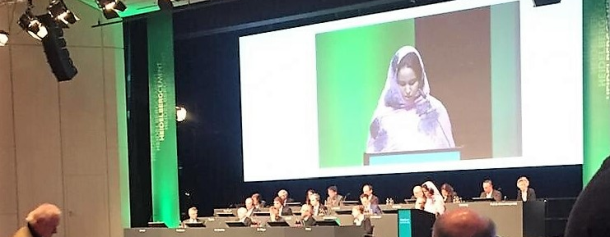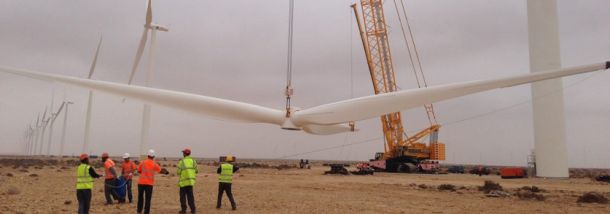
The massive ports that Morocco is constructing in occupied Western Sahara are made with cement of the German multinational.
Photo: Heidelberg Materials' factory in El Aaiun, occupied Western Sahara.
At its Annual General Meeting on 15 May 2025, Heidelberg Materials AG confirmed that it is supplying cement and concrete to the construction of large-scale infrastructure projects in occupied Western Sahara: the new ports of El Aaiún and Dakhla.
The German multinational, formerly known as HeidelbergCement, owns Ciments du Maroc, which operates two cement grinding mills and one concrete plant near El Aaiún, the capital city of occupied Western Sahara. In its responses to questions posed by Western Sahara Resource Watch (WSRW) during the AGM, Heidelberg Materials disclosed that:
- 500,000 tons of cement were produced annually in Western Sahara in 2023 and 2024.
- It sources 150,000 tons of limestone and pozzolana annually in Western Sahara, purchased from unnamed third-party suppliers. While the firm declined to disclose these suppliers due to “competition reasons,” it admitted that material volumes remained consistent with previous years.
- The company supplied concrete - though not cement - for the construction of the new and deeply controversial El Aaiún port.
- It sold approximately 50,000 tons of cement in both 2023 and 2024 to customers involved in building the Dakhla Atlantique megaport.
- Staff of parent company Heidelberg Materials is sent to Western Sahara on a regular basis for maintenance work.
The company’s statements mark the clearest admission to date of its involvement in Morocco’s consolidation of its illegal occupation through massive industrial developments in the territory.
Both port projects are part of Morocco’s strategic agenda to cement its control over the territory. The Dakhla Atlantique port, in particular, has been flagged as a geopolitical project aimed at turning occupied Western Sahara into a logistics hub linking Morocco with West African markets.
Heidelberg's local subsidiary, Ciments du Maroc, had previously stated on its website that it is providing cement to the new port in El Aaiún [or download]. The purpose of the new port - and an associated fertilizer plant - is for the Moroccan state phosphate company to export phosphate rock and fertilizer products from the territory that it illegally holds under occupation. That trade takes place in violation of international law.
By providing building materials, Heidelberg Materials enables the infrastructure that underpins Morocco’s occupation and resource exploitation of the territory. Such activity supports a settler-based economy and helps finance Morocco's strategic ambitions in the territory.
When asked if the company had sought the consent of the Saharawi people, Heidelberg Materials flatly responded that no such consent was necessary since it “does not mine raw materials” in Western Sahara. It further stated that as a private company, it is “not obliged” to seek such consent.
“This rationale is both factually and legally questionable. To be able to operate in the occupied part of Western Sahara, Heidelberg Materials will have been issued permits by the Moroccan government, which illegally occupies the territory. Furthermore, the company makes a profit from that government's infrastructure projects in the occupied territory without the consent of the people of the territory,” says Nina Matzik of Western Sahara Resource Watch.
In response to questions about how its operations align with its Human Rights Policy Statement, that asserts the company's commitment to the UN Civil and Social Covenants - which both include the right to self-determination in their first articles - Heidelberg Materials stated that “the implementation of the right to self-determination is the responsibility of states. As a private company, we fulfill our obligation to respect peoples' right to self-determination.”
“Heidelberg’s ongoing presence in Western Sahara is not just a business decision: it is a political one, with real consequences for the Saharawi people’s right to self-determination,” said Matzik. “You cannot claim neutrality while pouring the concrete of occupation.”
WSRW has made an English translation of the German original of the questions and answers at the 2025 Heidelberg Materials AGM.
Since you're here....
WSRW’s work is being read and used more than ever. We work totally independently and to a large extent voluntarily. Our work takes time, dedication and diligence. But we do it because we believe it matters – and we hope you do too. We look for more monthly donors to support our work. If you'd like to contribute to our work – 3€, 5€, 8€ monthly… what you can spare – the future of WSRW would be much more secure. You can set up a monthly donation to WSRW quickly here.
'We deserve an answer' from HeidelbergCement
When requesting answers on human rights from HeidelbergCement with regard to its operations in occupied Western Sahara, Saharawi Khadja Bedati was told that the company "deliberately makes social sponsoring of various sports clubs".
UK company building wind park in occupied Western Sahara
Morocco and Siemens press on with their plans to generate energy in the human rights black-spot that is Western Sahara: the first controversial wind farm near Boujdour is expected to be operational in December 2018, built by a UK company.
New controversial energy infrastructure to be built in Western Sahara
The Moroccan government has opened for a relatively large tender in Dakhla.
Report: Moroccan green energy used for plunder
At COP22, beware of what you read about Morocco’s renewable energy efforts. An increasing part of the projects take place in the occupied territory of Western Sahara and is used for mineral plunder, new WSRW report documents.



